Welcome New Faculty!
November 7, 2018
This semester six new faculty members joined the Electrical and Computer Engineering team, adding new experience. We are excited to have them join our team to contribute success of our department.
Dr. Seungdeog Choi
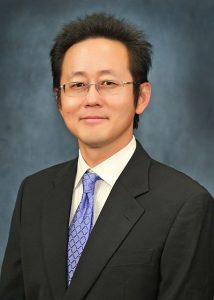
Dr. Seungdeog Choi, Associate Professor, received his Bachelor of Science degree from Chung-Ang University, South Korea in 2004, and his Master of Science degree from Seoul National University, South Korea in 2006, both in Electrical Engineering. He received his Ph.D. degree in the Electric Power and Power Electronics program at Texas A&M University in 2010. He served as an Assistant Professor at the University of Akron from 2012- 2018. Dr. Choi was employed by LG Electronics, Seoul, Republic of Korea from 2006 – 2007, and Toshiba International Corp., Houston, TX from 2009-2012, as a Researchand Development Engineer.
The key word of his research is “Reliability, Efficiency, and Power Density.” This includes the reliability control of power electronics systems, including: online condition monitoring, modeling, design and intelligent control of next generation power electronics system in various micro- and smart power grids (hybrid/electric vehicle, high speed train, electric ship and electric aircraft.) Dr. Choi’s research also focuses on the design of high reliability, high efficiency, high power density, and high-speed electric machine and drive system. He strives to achieve game changing design and applications of wide-band gap power devices (GaN and SiC power switches) in wider power electronics systems to significantly enhance energy efficiency and power density.
Dr. Yu Luo
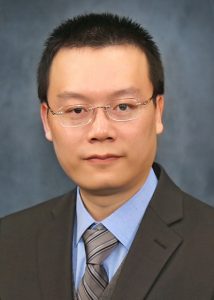
Dr. Yu Luo, Assistant Professor, received both his Bachelor of Science and Master of Science degree in Electrical and Information Engineering from Northwestern Polytechnical University in China. Dr. Luo received his Ph.D. degree in computer Science and Engineering from the University of Connecticut in 2015.
His research mainly focuses on the “Internet of Things,” such as sustainable wireless networks, and underwater acoustic communications. Currently, he is working on the emerging security issues in sustainable wireless networks with energy harvesting ability. The topics include the new energy attack mode in sustainable wireless networks, and how to defend information security using machine learning techniques.
In addition, Dr. Luo is also interested in environment-friendly acoustic communications. By using the cognitive technique, underwater acoustic modems are able to detect the presence of marine animals, and then change the transmission power and communication frequency intelligently to protect those animals. Dr. Luo's future research includes cyber-physical systems, intelligent healthcare services for animals, and passive acoustic communications.
Dr. Ali Cafer Gurbuz
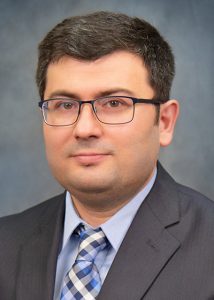
Dr. Ali Cafer Gurbuz, Assistant Professor, received his Bachelor of Science degree from Bilkent University, Ankara, Turkey, in 2003, in Electrical Engineering. He received his Master of Science and Ph.D. degree from Georgia Institute of Technology, Atlanta, GA in 2005 and 2008, also in Electrical and Computer Engineering.
Dr. Gurbuz’s research interest lies in the broad areas of signal processing and machine learning. More specifically, he is studying research problems such as sparse computational imaging for radar systems: GPR, SAR, radar based activity and gesture recognition, compressed learning, learning in time-frequency domain, deep learning based inverse problem solutions, machine learning and sensor fusion solutions in remote sensing utilizing hyperspectral, thermal, LiDAR and Radar sensors, cognitive radar and spectrum sharing.
Dr. Chaomin Luo
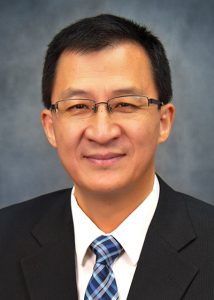
Dr. Chaomin Luo, Associate Professor, received his Bachelor of Science in Electrical Engineering from Southeast University, Nanjing, China. He received his Master of Science in Engineering Systems and Computing at the University of Guelph, Guelph, Canada, and then his Ph.D. in Electrical and Computer Engineering from the University of Waterloo, Canada, in 2008.
His research interests include robotics, autonomous vehicle systems and control, applied machine learning for robotics, computational intelligence, and embedded systems (VLSI/FPGA CAD). Currently, the main focuses are on sensors configuration for robotics design, and applied machine learning for autonomous systems such as navigation, localization, and biologically inspired intelligence for motion planning. He was the panelist in the Department of Defense, USA, 2015-2016, 2016-2017 NDSEG Fellowship program, and the panelist in 2017 NSF GRFP Panelist program.
Dr. Luo was the General Co-Chair of 2015 IEEE International Workshop on Computational Intelligence in Smart Technologies, and Journal Special Issues Chair, IEEE 2016 International Conference on Smart Technologies, Cleveland, OH, USA. Currently, he is Associate Editor of International Journal of Robotics and Automation, and International Journal of Swarm Intelligence Research. Dr. Luo’s current research projects include: multi-goal motion planning of an autonomous robot in unknown environments by an ant colony optimization approach, a bioinspired neural network for real-time concurrent map building and complete coverage robot navigation in unknown environments, bio-inspired and machine learning based approaches to task assignment of swarm robots in 3-d dynamic environments, etc.
Dr. Chun-Hung Liu
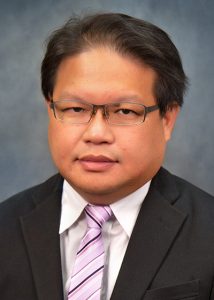
Dr. Chun-Hung Liu, Assistant Professor, received his Bachelor of Science in Electrical Engineering from National Taiwan University, his Master of Science in Electrical Engineering from Massachusetts Institute of Technology, and his Ph.D. from the University of Texas, Austin.
Dr. Liu’s research currently focuses on 5G heterogeneous and UAV networks. The main topics he has been investigating are: network coverage and throughput, device-to-device (machine-to-machine) communications, green communications and physical layer security under by using different user association schemes and interference cancellation techniques, BS coordination and (adaptive and random) beamforming techniques. For these topics, he is studying their fundamental limits, and how these limits could be achieved. For example, he has developed a novel mathematical formulation and framework based on stochastic geometry and a random graph theory to successfully, accurately evaluate the coverage and link throughput limits in a large-scale network with low-complexity.
Dr. Chun-Hung Liu says, “The most important feature of my research works is that my analytical results are usually found in a low-complexity form so that people can easily get some insights into how network parameters interplay and how to implement my proposed schemes in order to efficiently improve the transmission performances in a network.”
Dr. Vuk Marojevic
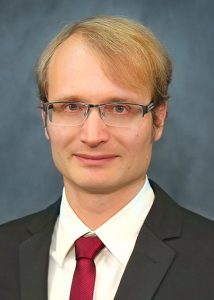
Dr. Vuk Marojevic, Associate Professor, received his Bachelor of Science and Master of Science from University of Hannover, Germany, and his Ph.D. at Universitat Politecnica de Catalunya, Barcelona, Spain, in Electrical Engineering.
Prior to joining Mississippi State University, Dr. Marojevic was with Wireless at Virginia Tech, where he built and managed Virginia Tech’s LTE and cognitive radio testbeds, among others. His research interests are in: resource management, LTE, New Radio, V2X, physical layer security, spectrum sharing, software radios, millimeter wave communications, artificial intelligence, and wireless network virtualization with application to commercial communications and networking, mission-critical networks, unmanned aircraft systems and autonomous and connected vehicles.
Dr. Marojevic’s goals are to build a strong research program that addresses both fundamental and practical research questions, and to develop new tools for hands-on education.
Category: News
